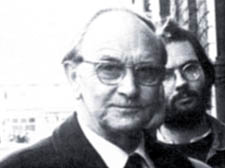|
|
 |
| |

Jack Jones out on the streets of his native Liverpool |
A fighter for liberty who dug trenches, and graves, in Spain
International Brigade veteran and trade union leader dies aged 96
Jack Jones, who died this week, was leader of the Transport and General Workers Union from 1969 to 1978.
Born in Liverpool in 1913, the son of a docker became a union activist after joining a shipyard in the city as a 14-year-old apprentice.
He fought in the Spanish Civil War between 1937 and 1939.
Later, he refused a peerage?? and became a campaigner for pensioners’ rights.
Below, Dan Carrier recalls a meeting with the then 94-year-old, back in Spain to commemorate the anniversary of the bombing of Guernica, subject of an anti-war painting by Picasso.
IN the Basque town of Guernica, a tiled frieze of Picasso’s painting occupies a wall stretching along a quiet back street. The original has never been displayed there: the central government fears an appearance of the iconic work would stir up Basque nationalism.
In July 2006, I travelled to northern Spain to mark the 70th anniversary of the bombing of the town by Germany’s Condor Legion, and while there I unexpectedly met Jack Jones, the legendary trade unionist who went to Spain all those years ago to fight for freedom.
Jack was back in Guernica to attend an event commemorating the bombing.
The day I arrived I visited a square which boasts a bust of George Steer, the journalist who told the world of the atrocity. I then wandered through the tight streets, sluggish under the warm summer sun, until I came across the Guernica relief.
It was while I was admiring the work that a taxi pulled up and out stepped 94-year-old Jack, former president of the Transport and General Workers Union and a Liverpool docker who fought in Spain.
To meet him by chance in the town that represented the destructive horror of fascism was a unique opportunity to speak to a living legend. After I introduced myself, he told me of the time in the late 1930s when he took up arms against fascism.
He revealed how he had tried to get to Spain as the conflict began. “I had some Territorial training and I was young and fit,” he recalled. “News of reverses threw a black shadow across my life and I wanted to go.”
But he was turned away by Liverpool’s Aid for Spain committee, who thought he was too valuable as a dockers’ union organiser to be risked. But when friends were killed at the Battle of Jarama in 1937, he was given the tragic task of telling their families. Jack felt he could not stay in Liverpool, and again applied to join the International Brigade. This time he was successful.
Like so many other volunteers, he trekked over the Pyrenees, avoiding border guards, and then on to the Brigade’s training headquarters in Figueras. His first experience of the violent struggle came when he delivered a message from trade union leader Ernest Bevin to the Spanish union, the UGT. Jack recalled helping an aged Spaniard dig a trench, and remembered him shouting “Yo lucha para Libertad”, or “I fight for liberty”, as he dug at the stony soil. Within minutes he would be dead. Jack had to stop scraping trenches out of the hard earth and dig a grave instead.
“People have asked me: ‘Did you kill anyone in Spain?’ ” he said. “Frankly, I do not know, but it is possible. In that engagement I didn’t think of death, yet people were being killed and wounded by my side.
“In battle, one experiences a numbness that is difficult to describe. One’s first impulse is to protect oneself as much as possible and then fire in the direction of the enemy. One tries to pinpoint a target, but almost in a frenzy. To keep cool and calm in such circumstances is an ideal not easily achieved. All I do know is that some of my comrades were killed and wounded and men on the other side suffered the same fate. That is war.”
He was also at the battle of the Ebro, and was involved in the attempt by British volunteers to recapture a strategic point called Hill 481. Many of his comrades were killed and Jack was shot in the shoulder.
“Suddenly my right arm and shoulder went numb,” he recalled. “Blood gushed from my shoulder and I couldn’t lift my rifle. I could do nothing but lie where I was.” His injury was so severe he was eventually sent back to England, although he would go back to Spain to carry supplies and messages to his Spanish comrades in the UGT before the war ended.
Jack spent the rest of his life working for peace, workers’ rights, justice and socialism, and became a key figure in the TGWU. He led the union between 1969 and 1978, and helped draw up the Social Contract between the Labour government and trade unions. His influence cannot be overestimated.
In his later years, he was honorary president of the International Brigade Memorial Trust. He will be warmly remembered by all who knew him. |
 |
|
|
 |
| |
| |
|
 |
|